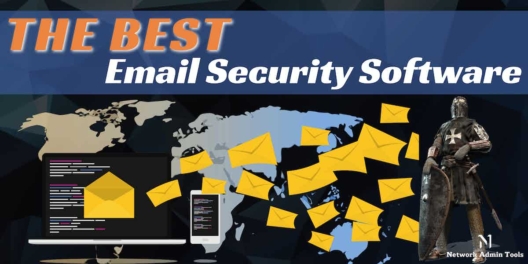Emails are one of the secure ways to communicate professionally. Yet, is it one hundred percent secure? No, at least not, unless and until you set up an email encryption system. There are high chances that any unauthorized person couldn’t access your mail without encryption. After all, you don’t want the whole world to see […]
The Best Email Encryption Services
The Best Email Security Software
Email is a common channel for cybercriminals to hack into a system because it was originally designed to be open and accessible to everyone. Of course, those were the nascent stages of the Internet when such sophisticated attacks were unheard of. But as the Internet grew, it became a popular vector for attacks as hackers […]
Business Email Security Best Practices
Email is the most popular and preferred channel for business communication today. It is estimated that about 63% of business professionals prefer to use emails for their business communication, and each employee sends an average of 40 emails per day for business purposes. But there’s also a downside to this widespread usage, and that’s unauthorized […]
Setting Reply-to Address in Pine
We often need to mail brief messages from servers to send config files, or quick messages to other sysadmins. Pine works well for this, and the installation is mostly a single binary. We usually are logged in on some account that isn’t the email address we wish replies to come to. It turns out that […]
Tips on Running a Google Apps Pilot
When migrating from an internal email system to Google Apps, it’s nice to have the option of running a pilot program including a few of your users to try it out, and then to move the rest of the users over when problems with the transition have been identified and addressed. This is pretty easy […]
Rejecting Email Based on Headers With Postfix
Postfix has the ability to reject mail based on regular expression matching in the header of the incoming mail message. To enable this, add these lines to main.cf: header_checks = regexp:/etc/postfix/header_checks header_checks = pcre:/etc/postfix/header_checks We stuck these after the alias line. Add the header content matches and actions to header_checks (usually in /etc/postfix) and restart […]
Clearing Bad Messages Out of the Postfix Mail Queue
If you have bad messages in your Postfix mail queue, you can list them with the postqueue command: [root@svr-1 mail]# postqueue -p -Queue ID- –Size– —-Arrival Time—- -Sender/Recipient——- 4C63F2300BA 876 Mon Jun 5 09:31:54 user@somedomainsomewhere.com (connect to example.com[192.0.34.166]: Connection timed out) differentuser@example.com — 1 Kbytes in 1 Request. You will need the Queue Id to […]
Blue Security DDOS
There is an excellent discussion of the Blue Security DDOS attack here, including a copy of discussion from those behind the DDOS here. There is more information on Blue Frog and related issues on Wikipedia here. If you somehow missed this, it is probably in your best interest to be aware of what is going […]
Avoid Unwanted Email
The opportunists who send unsolicited bulk email (UBE) use tools that do not follow standards. This can work to an advantage in that improper configuration can allow quite a bit of filtering to be done on inbound email. For instance, the following entries in main.cf for postfix will dramatically cut down on email from misconfigured […]
Using UW IMAP and Xinetd For Dual SSL and Plaintext Support
First off, Pine rocks when it comes to reading mail quickly, particularly on a server where a GUI is not available. Second of all, it often doesn’t come with GNU/Linux distributions anymore. I suppose that part of the problem is that pine includes a version of IMAP that can cause problems if it coexists with […]
Postfix Source RPM Upgrade for Red Hat Enterprise Linux 3
In this article, we upgraded Postfix to 2.2.5 via RPMs; however, if a later version is needed, and you are running Red Hat Enterprise Linux Version 3 (RHEL 3), an RPM needs to be created from source. There is a source RPM for 2.2.6 available here: http://postfix.wl0.org/ftp/official/2.2/SRPMS/ To use the RPM, install it: [root@s root]# […]
Postfix RPM Upgrade for Red Hat Enterprise Linux 3
One of the servers we work on is running Red Hat Enterprise Linux 3 (RHEL 3). We needed some features in the later versions of Postfix, rather than the backported version for RHEL 3. There are some RPMs available here: http://postfix.wl0.org/ftp/official/2.2/RPMS-rhel3-i386 The latest version as of the date of this article is 2.2.5-3. If you […]
Wadding up Spambots With Spiderkiller
Spiderkiller is a C program that will generate unique pages with random email addresses that will confuse harvesting bots. Compile the app: srv-5:~ usr4$ gcc spiderkiller.c -o spiderkiller spiderkiller.c: In function ‘main’: spiderkiller.c:299: warning: incompatible implicit declaration of built-in function ‘strlen’ The options are simple: srv-5:~ usr4$ ./spiderkiller -help Usage: spiderkiller [-help] [-n ] [-k […]
Adding an Alias to Postfix
If you simply want to make a mailbox receive mail for another address, just add the full address to /etc/postfix/virtual: [root@srv-2 postfix]# cat virtual usr-1@networking.com usr usr-1@networking2.com usr usr-2@maildomain.com anotherusr If we simply add this line to the bottom: usr-3@maildomain.com anotherusr Mail that was was delivered previously via usr-2@maildomain.com will be delivered in the same […]
UNIX and Outlook Express Interoperability
The MIME on Outlook Express seems to be broken. We have seen several instances where Outlook Express users cannot read Email sent by UNIX Email clients. The message is garbled with lots of question marks and other random characters. We have had this problem here at netadmintools.com, since we use Linux Office Suite 99 for […]
Using Watch-maillog To Reduce Spam Chatter
It is truly amazing how many resources are taken up on a server by other rogue boxes searching for an open relay, or simply sending dictionary attempts at finding local users. Watch-maillog is a perl script that uses IPtables to block mail servers that abuse your server. Watch-maillog helps with this by blocking servers that […]
Osirusoft Is Blocking All Hosts
Due to DDoS attacks on Osirusoft, Osirusoft decided to reject all. So, if you are using Osirusoft to block spam, stop! Well, hats off to the valiant efforts of Osirusoft. Can’t really blame them for their reaction to this world of shit. The beautiful thing is that sysadmins and others in our community will find […]
Test SMTP (email) via Telnet
One good trick to use when testing your email server is to use telnet. To send email, you can just telnet into the destination email server directly: u-1@srv-1 u-1 $ telnet yourmailserver.com 25 Trying 21.40.23.46… Connected to yourmailserver.com. Escape character is ‘^]’. 220 mx.yourmailserver.com ESMTP Sendmail 8.12.9/8.12.9; Thu, 12 Jun 2003 10:06:19 -0700 helo frommail.com […]
Landmark Washington Spam Case Victory
As you may or may not know, Washington State has a spam law that forbids deceptive email practices. For more info on this law see this area of the Attorney General of Washington’s website. Well, a landmark case regarding this law has just been decided. We put a copy of the release up on NetAdminTools […]
Cloudmark SpamNet
As systems administrators, we abhor spam. It bogs down servers, floods our personal mailboxes, and wastes our user’s time. As web content providers, we also are extremely annoyed that email contact information is blatently reaped and abused. The Internet can be so much more than a cesspool of spam. On the other hand, the Internet […]





